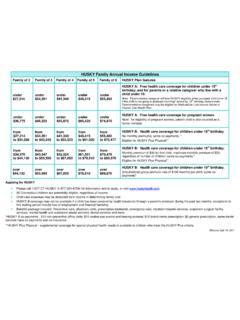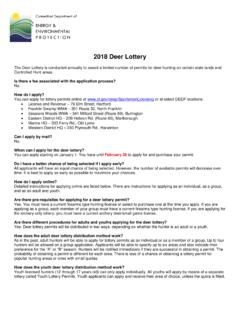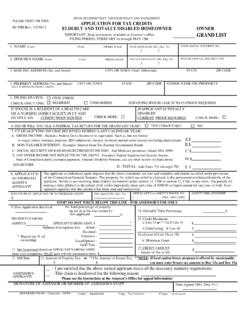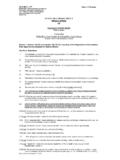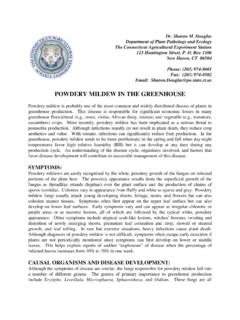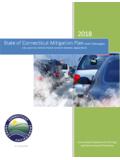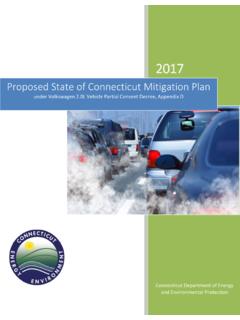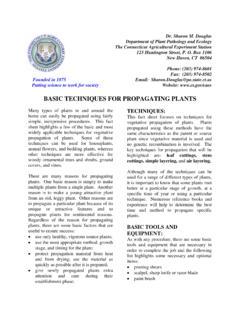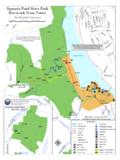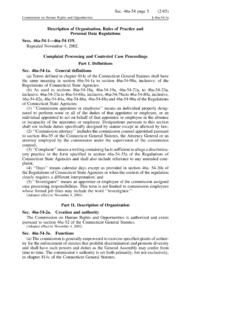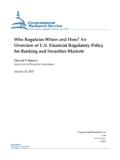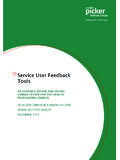Transcription of Instructions for Completing the Permit Application for ...
1 DEEP-WPED-INST-100 1 of 31 Rev. 12/13/16 Instructions for Completing the Permit Application for wastewater discharges from manufacturing , commercial , or Other Activities Use these Instructions to complete the Permit Application form DEEP-WPED-APP-100; 2) prepare supporting documents and publish the applicant's notice of Permit Application if applicable. These Instructions are not a substitute for the requirements of the relevant statutes and any regulations thereunder. You should review all applicable laws prior to Completing this Application . Remember, it is your responsibility to comply with all applicable laws.
2 Introduction This Permit program, administered by the Water Permitting and Enforcement Division (WPED) of the Department of Energy and Environmental Protection (DEEP), regulates discharges to the waters of the state, including surface water, ground water and Publicly Owned Treatment Works (POTW) (which includes sanitary sewers) to prevent pollution of the waters of the state and to prevent adverse impacts upon the operation of POTWs. The subject Application must be completed and submitted for wastewater discharges from manufacturing , commercial , Mining, or Silvicultural Activities, Landfills, and Concentrated Aquatic Animal Production Facilities.
3 Use different, specific applications for wastewater Discharges from Agricultural Activities, Subsurface Sewage Treatment and Disposal Systems (includes septic systems), Domestic Sewage Treatment Works (includes discharges from POTWs and privately owned domestic sewage treatment facilities). Refer to for the specific wastewater discharge applications. DEEP uses both individual and general permits to regulate discharges. Individual permits are issued directly to an applicant. General permits are issued to authorize similar minor discharges by one or more applicants.
4 Authorization and registration requirements under a general Permit are specified by each general Permit . Since the general Permit process is quicker, hence less costly, be sure to check the List of General Permits (DEEP-FS-004) in order to determine whether any of your discharges may be eligible for authorization under a general Permit before applying for an individual Permit . The Permit Application form (DEEP-WPED-APP-100) and these Instructions must be used to apply for individual permits. Other short processes such as emergency and temporary authorizations may apply to your proposed discharge .
5 Consult the Short Permit Process Fact Sheet (DEEP-FS-003) or call WPED at 860-424-3018 for more information. DEEP issues individual discharge permits in three major categories depending on where the wastewaters are discharged; permits for discharges to surface water, permits for discharges to ground water, and permits for discharges to a POTW. DEEP will issue up to three permits for a single site, one for each type of receiving water utilized. A single Permit DEEP-WPED-INST-100 2 of 31 Rev. 12/13/16 Application form (DEEP-WPED-APP-100) may be used to apply for up to three permits for all discharges originating from the same site.
6 DEEP will include all discharges to a common type of receiving water ( , surface waters) in a single Permit . The Surface Water discharge Permit Program, also known as the National Pollutant discharge Elimination System (NPDES) under Federal Law, regulates discharges into surface waters, directly or through municipal storm sewer drainage systems or through other drainage systems such as wetlands or swales. The Ground Water discharge Permit Program regulates discharges to ground water from any source, including but not limited to large septic systems, agricultural waste management systems and all waste landfills.
7 Use separate applications for wastewater Discharges from Agricultural Activities or Subsurface Sewage Treatment and Disposal Systems (includes septic systems). The Pre-treatment Permit Program regulates discharges to a POTW, through municipal sanitary sewer drainage systems or through combined storm and sanitary sewer systems. All wastewaters, (excluding domestic sewage), hauled directly to a POTW will require either a pre-treatment Permit or will be regulated under the POTW's Permit . The Connecticut Department of Public Health and Addiction Services regulates domestic sewage hauled directly to a POTW.
8 Who Needs a Permit ? Any person or municipality that discharges water, substance or material into the waters of the state, which includes surface waters, storm drains, ground waters, and POTWs, is required to obtain a Permit from DEEP prior to initiating the discharge . Any person or municipality who proposes to initiate, create, originate or maintain a new discharge must submit a completed Permit Application to DEEP and obtain a Permit from DEEP prior to discharging. Any person proposing to continue a previously permitted discharge , must apply for renewal of the existing Permit by submitting a sufficient Permit Application at least one hundred eighty (180) days prior to the expiration date of the existing Permit .
9 If your Application is or may be untimely, ( submitted less than 180 days before the expiration date), please refer to section 22a-6j of the Connecticut General Statutes (CGS). If a renewal Application is not submitted prior to the expiration date of the existing Permit , then the existing Permit is deemed to have expired. Any person proposing to transfer a DEEP Permit must submit a completed License Transfer form (DEEP-APP-006) and transfer fee to DEEP. The License Transfer form may be used for changes in owners and operators of the licensed activity; if other changes are proposed to the facility, the site, and/or to facility operations, the proposed transferee must also request a Permit modification.
10 In some cases, Permit modifications may require submittal of parts of or up to an entire individual Permit Application . For further information concerning license transfers please contact the Permit Assistance Office at 860-424-3003. For further information concerning modifications, please contact WPED at 860-424-3018. Notice of Permit Application Section 22a-6g of the Connecticut General Statutes imposes public notification requirements on applicants for certain permits issued by DEEP. In order to comply with these requirements, you must: 1. Publish notice of the Permit Application in a newspaper of general circulation in the area potentially affected by the activity that is the subject of your Permit Application .
